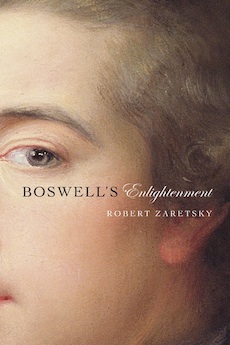By D.T. Siebert
Robert Zaretsky’s excellent book provides a wealth of information about Enlightenment thought, all of it brought to life in the mind and imagination of that irrepressible Scot, James Boswell. Boswell is famous for his great biography of Samuel Johnson, and perhaps no less so for the copious, lively, revealing journals of his own life. But Boswell did not just cultivate a lifelong friendship with Johnson. He also became acquainted with a stellar array of important people in 18th century Britain and Europe. By focusing on Boswell’s intellectual adventures (and some of more carnal variety), Zaretsky allows us to view the Enlightenment through Boswell’s eyes.
Zaretsky begins with a discussion of the Enlightenment, once viewed as a monolithic program of political and intellectual reform. Recent intellectual history, however, suggests that there was no single conception called the Enlightenment, even if labels like “the Scottish Enlightenment” do conveniently group together thinkers who share many assumptions. Zaretsky inventively describes this emerging view. Quoting Peter Gay’s assertion that there were “many philosophes in the eighteenth century but there was only one Enlightenment,” Zaretsky continues:
“In his insistence on a ‘unified field theory’ for the Enlightenment, Gay is the historical profession’s Einstein. Time has taken its toll on Gay’s various metaphors—‘party,’ ‘family,’ and ‘flock’—that imposed a kind of unity on the conflicting and contradictory characteristics of the Enlightenment. Like physicists working in the shadow of Heisenberg and Bohr, historians have since resigned themselves to a phenomenon that refuses to obey any single set of laws.”
Boswell’s Enlightenment is also the reader’s enlightenment. The book surveys the major ideas of this period’s thinkers, from luminaries like Johnson and Hume, Voltaire and Rousseau, to somewhat lesser lights like Adam Smith and Hugh Blair, Montesquieu and Diderot. But there are many others. Even that learned, witty rake and political gadfly John Wilkes receives his share of attention. Wherever he goes, Boswell is always agonizing over his religious beliefs, his mortality, the problem of fate and free will, and the possibility of an afterlife. Wilkes cavalierly dismisses these concerns as a waste of time. “Let’em alone,” he tells Boswell, and instead enjoy life: “Thank heaven for having given me the love of women. To many she gives not the noble passion of lust.” Apparently the Enlightenment had room enough even for Wilkes’s libertine creed. Wilkes then encourages Boswell, who hardly needed much encouragement, to get his own fill of that noble passion. Likewise he advises Boswell on how to court a bright young Dutch aristocrat met earlier in his travels: “Go home by Holland and roger her.” [“Roger” is an 18th-century verb for the sex act.]
Among the many sections of the book deserving particular praise, Zaretsky’s discussion of what the Lisbon earthquake meant to the age is quite revealing, especially in how Zaretsky contrasts the reactions of Voltaire and Rousseau to that catastrophe. And again, this contrast confirms the view that there was no unified value-system among the philosophes. Voltaire was the champion of advanced civilization, after being much reformed and freed from the domination of church and corrupt government. Rousseau instead championed that idealization often known simply as “the noble savage.”
One particular anecdote emblemizing Voltaire’s “religion” is his reconstruction of a parish church on his estate at Ferney. Facing opposition from the local authorities in his plan to raze the church, he had it rebuilt in his own taste, including a large statue of Christ, not on the cross but rather “as a sage of antique wisdom.” A crowning touch was the inscription: “Deo erexit VOLTAIRE” [Built for God by Voltaire]. One notices, of course, that Voltaire’s name is larger than God’s.
There is little to fault in Zaretsky’s book. Its style is scintillating, even if one might demur that the author sometimes strains too hard to give birth to metaphor. And phrases like “a tad” and “knocked up” may seem out of place. Overall, however, the book deserves the highest praise.
D.T. Siebert (ΦBK, University of Oklahoma, 1962) is Distinguished Professor Emeritus of English Literature at the University of South Carolina, Columbia. His recent book Mortality’s Muse: The Fine Art of Dying (Delaware, 2013) was reviewed in The Key Reporter in 2014.




